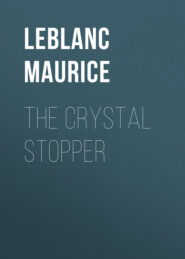По всем вопросам обращайтесь на: info@litportal.ru
(©) 2003-2025.
✖
813
Настройки чтения
Размер шрифта
Высота строк
Поля
She stood silent, with staring eyes; impassive, any emotion which she might have felt was not enough to rouse her slumbering intelligence.
Lupin asked for a pencil and paper and wrote down the number 813.
The count smiled again.
"Look here, what are you laughing at?" cried Lupin, irritably.
"Nothing.. nothing… I'm very much interested, that's all.."
Isilda looked at the sheet of paper, when he showed it to her, and turned away her head, with a vacant air.
"No bite!" said the count, satirically.
Lupin wrote the letters "APOON."
Isilda paid no more attention than before.
He did not give up the experiment, but kept on writing the same letters, each time watching the girl's face.
She did not stir, but kept her eyes fixed on the paper with an indifference which nothing seemed to disturb. Then, all at once, she seized the pencil, snatched the last sheet out of Lupin's hands and, as though acting under a sudden inspiration, wrote two "L's" in the middle of a space left open by Lupin.
He felt a thrill.
A word had been formed: "APOLLON."
Meanwhile, Isilda clung to both pencil and paper and, with clutching fingers and a strained face, was struggling to make her hand submit to the hesitating orders of her poor little brain.
Lupin waited, feverishly.
She rapidly wrote another word, the word "DIANE."
"Another word!.. Another word!" shouted Lupin.
She twisted her fingers round the pencil, broke the lead, made a big "J" with the stump and, now utterly exhausted, dropped the pencil.
"Another word! I must have another word!" said Lupin, in a tone of command, catching her by the arm.
But he saw by her eyes, which had once more become indifferent, that that fleeting gleam of intelligence could not shine out again.
"Let us go," he said.
He was walking away, when she ran after him and stood in his path. He stopped:
"What is it?"
She held out the palm of her hand.
"What? Money?.. Is she in the habit of begging?" he asked the count.
"No," said Waldemar, "and I can't understand."
Isilda took two gold coins from her pocket and chinked them together, gleefully.
Lupin looked at them. They were French coins, quite new, bearing the date of that year.
"Where did you get these?" asked Lupin, excitedly.
"French money!.. Who gave it you?.. And when?.. Was it to-day? Speak!.. Answer!." He shrugged his shoulders. "Fool that I am! As though she could answer!.. My dear count, would you mind lending me forty marks?.. Thanks.. Here, Isilda, that's for you."
She took the two coins, jingled them with the others in the palm of her hand and then, putting out her arm, pointed to the ruins of the Renascence palace, with a gesture that seemed to call attention more particularly to the left wing and to the top of that wing.
Was it a mechanical movement? Or must it be looked upon as a grateful acknowledgment for the two gold coins?
He glanced at the count. Waldemar was smiling again.
"What makes the brute keep on grinning like that?" said Lupin to himself. "Any one would think that he was having a game with me."
He went to the palace on the off-chance, attended by his escort.
The ground-floor consisted of a number of large reception-rooms, running one into the other and containing the few pieces of furniture that had escaped the fire.
On the first floor, on the north side, was a long gallery, out of which twelve handsome rooms opened all exactly alike.
There was a similar gallery on the second floor, but with twenty-four smaller rooms, also resembling one another. All these apartments were empty, dilapidated, wretched to look at.
Above, there was nothing. The attics had been burnt down.
For an hour, Lupin walked, ran, rushed about indefatigably, with his eyes on the look-out.
When it began to grow dusk, he hurried to one of his twelve rooms on the first floor, as if he were selecting it for special reasons known to himself alone. He was rather surprised to find the Emperor there, smoking and seated in an arm-chair which he had sent for.
Taking no notice of his presence, Lupin began an inspection of the room, according to the methods which he was accustomed to employ in such cases, dividing the room into sections, each of which he examined in turn.
After twenty minutes of this work, he said:
"I must beg you, Sire, to be good enough to move. There is a fireplace here.."
The Emperor tossed his head:
"Is it really necessary for me to move?"
"Yes, Sire, this fireplace."
"The fireplace is just the same as the others and the room is no different from its fellows."
Lupin looked at the Emperor without understanding. The Emperor rose and said, with a laugh:
"I think, M. Lupin, that you have been making just a little fun of me."
Lupin asked for a pencil and paper and wrote down the number 813.
The count smiled again.
"Look here, what are you laughing at?" cried Lupin, irritably.
"Nothing.. nothing… I'm very much interested, that's all.."
Isilda looked at the sheet of paper, when he showed it to her, and turned away her head, with a vacant air.
"No bite!" said the count, satirically.
Lupin wrote the letters "APOON."
Isilda paid no more attention than before.
He did not give up the experiment, but kept on writing the same letters, each time watching the girl's face.
She did not stir, but kept her eyes fixed on the paper with an indifference which nothing seemed to disturb. Then, all at once, she seized the pencil, snatched the last sheet out of Lupin's hands and, as though acting under a sudden inspiration, wrote two "L's" in the middle of a space left open by Lupin.
He felt a thrill.
A word had been formed: "APOLLON."
Meanwhile, Isilda clung to both pencil and paper and, with clutching fingers and a strained face, was struggling to make her hand submit to the hesitating orders of her poor little brain.
Lupin waited, feverishly.
She rapidly wrote another word, the word "DIANE."
"Another word!.. Another word!" shouted Lupin.
She twisted her fingers round the pencil, broke the lead, made a big "J" with the stump and, now utterly exhausted, dropped the pencil.
"Another word! I must have another word!" said Lupin, in a tone of command, catching her by the arm.
But he saw by her eyes, which had once more become indifferent, that that fleeting gleam of intelligence could not shine out again.
"Let us go," he said.
He was walking away, when she ran after him and stood in his path. He stopped:
"What is it?"
She held out the palm of her hand.
"What? Money?.. Is she in the habit of begging?" he asked the count.
"No," said Waldemar, "and I can't understand."
Isilda took two gold coins from her pocket and chinked them together, gleefully.
Lupin looked at them. They were French coins, quite new, bearing the date of that year.
"Where did you get these?" asked Lupin, excitedly.
"French money!.. Who gave it you?.. And when?.. Was it to-day? Speak!.. Answer!." He shrugged his shoulders. "Fool that I am! As though she could answer!.. My dear count, would you mind lending me forty marks?.. Thanks.. Here, Isilda, that's for you."
She took the two coins, jingled them with the others in the palm of her hand and then, putting out her arm, pointed to the ruins of the Renascence palace, with a gesture that seemed to call attention more particularly to the left wing and to the top of that wing.
Was it a mechanical movement? Or must it be looked upon as a grateful acknowledgment for the two gold coins?
He glanced at the count. Waldemar was smiling again.
"What makes the brute keep on grinning like that?" said Lupin to himself. "Any one would think that he was having a game with me."
He went to the palace on the off-chance, attended by his escort.
The ground-floor consisted of a number of large reception-rooms, running one into the other and containing the few pieces of furniture that had escaped the fire.
On the first floor, on the north side, was a long gallery, out of which twelve handsome rooms opened all exactly alike.
There was a similar gallery on the second floor, but with twenty-four smaller rooms, also resembling one another. All these apartments were empty, dilapidated, wretched to look at.
Above, there was nothing. The attics had been burnt down.
For an hour, Lupin walked, ran, rushed about indefatigably, with his eyes on the look-out.
When it began to grow dusk, he hurried to one of his twelve rooms on the first floor, as if he were selecting it for special reasons known to himself alone. He was rather surprised to find the Emperor there, smoking and seated in an arm-chair which he had sent for.
Taking no notice of his presence, Lupin began an inspection of the room, according to the methods which he was accustomed to employ in such cases, dividing the room into sections, each of which he examined in turn.
After twenty minutes of this work, he said:
"I must beg you, Sire, to be good enough to move. There is a fireplace here.."
The Emperor tossed his head:
"Is it really necessary for me to move?"
"Yes, Sire, this fireplace."
"The fireplace is just the same as the others and the room is no different from its fellows."
Lupin looked at the Emperor without understanding. The Emperor rose and said, with a laugh:
"I think, M. Lupin, that you have been making just a little fun of me."











